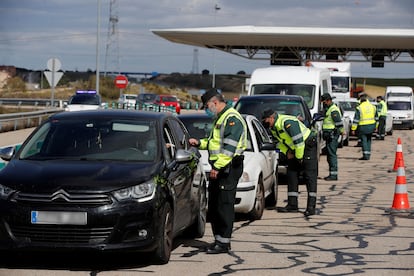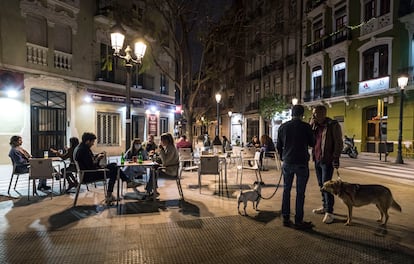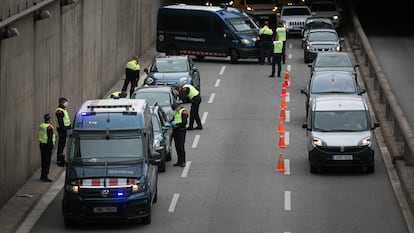What will happen when Spain’s state of alarm expires? Supreme Court set to take key role with express rulings
The country’s regional governments have been calling for more action from the central government in order to avoid judicial chaos once the emergency situation ends on May 9

With the end of the state of alarm set to end on Sunday, many of Spain’s regions – which are in charge of controlling the pandemic in their territories – are increasingly worried about what impact this will have on efforts to curb the spread of the coronavirus. For the past six months, the emergency measure has given the regions the authority to introduce restrictions that curb fundamental rights, such as the nighttime curfew, without facing challenges in the courts. But there is concern that could all change on May 9, when the state of alarm comes to an end.
In a bid to ease these fears, the Spanish government – a coalition of the Socialist Party (PSOE) and junior partner Unidas Podemos – has approved a royal decree that gives the Supreme Court the final word on coronavirus restrictions. The new rule, published Wednesday in the Official State Bulletin (BOE), aims to prevent the legal chaos that occurred last year between June and October, when judges from lower courts reached contradictory decisions on coronavirus restrictions affecting fundamental rights. This situation led to confusing situations whereby on the same day a court in Barcelona rejected limiting public and private meetings in L’Hospitalet to fewer than 10 people, while another judge in Lleida permitted such a restriction in the area of Segrià.
Under the new decree, if a lower court refuses to authorize a coronavirus restriction that affects fundamental rights, a region can appeal the decision to the Supreme Court – something that has not been possible until now. The goal of this is to enable the country’s top judges to set down uniform criteria for when regional governments and the central administration itself can and cannot limit rights and under what conditions. In other words, regions can restrict fundamental rights to curb the coronavirus pandemic without a state of alarm if they have the backing of the courts.

The decree also expedites the appeals process to ensure that disputes are resolved in a maximum of two weeks. In the case that a coronavirus restriction is struck down by a lower court, a region has three days to appeal. The public prosecution and the defendants then have another three days to present their arguments. Once this is done, the Supreme Court must reach a ruling within five days. As such, it is hoped that the court will have reached a decision on the most controversial coronavirus restrictions – such as the nighttime curfew and limits on social gatherings – within a few weeks.
But the decree, which comes into effect on Sunday, has been criticized by several regions and the court itself. Judge César Toloa, the president of the Administrative Bench of the Supreme Court, told the Spanish news agency EFE: “Judges are not here to govern, these decisions correspond to public authorities.”
The premier of Galicia, Alberto Núñez Feijóo, of the conservative Popular Party (PP), told EL PAÍS that the measure was a sign of the “judicialization of the pandemic,” and accused Prime Minister Pedro Sánchez of “washing his hands” of the management of the health crisis. He argued that requiring regions to get the support of the courts in order to maintain coronavirus restrictions will lead to weeks or months of “uncertainty.” Feijóo is one of several regional leaders who have called for the state of alarm to be extended beyond May 9 – an option that the central government has ruled out.
The spokesperson for the Andalusian regional government, Elías Bendodo, also of the PP, was equally critical of the decree, arguing “the government is showing it has no intention of assuming its responsibilities.” At Wednesday’s meeting of the Inter-Territorial Council of the National Health System, which brings together health officials from the central and regional governments, Andalusia called for the Public Health law to be modified to give regions more power to introduce restrictions. But the central government does not consider this to be a viable option, given that such a reform could be unconstitutional.
“The state of alarm is considered for exceptional situations, not for it to be sine die,” said Health Minister Carolina Darias. “We believe that the measures available to the regions in accordance with ordinary legislation and in accordance with the royal decree approved yesterday [on Wednesday] are enough to fight the virus.”
What restrictions will remain in place?
With just days to go until the end of the state of alarm, regions are now rushing to work out formulas to keep coronavirus restrictions in place.
The regional government of Navarre is planning to sign an order once the emergency situation expires that lifts the perimetral lockdown of the region, but extends the nighttime curfew and the six-person limit on social gatherings between two households.
The Balearic Islands have called an extraordinary session to approve measures to maintain the region’s curfew, restrictions on social gatherings in private spaces, security controls on travelers and limits on capacity in places of worship. These measures will then be sent before the Supreme Court of the archipelago for approval.

The Catalan regional government has said that it does not plan to extend the nighttime curfew, but has asked the High Court for authorization to extend the six-person limit on social gatherings and restrictions on capacity in places of worship.
Authorities in Castilla-La Mancha, the Canary Islands and the Basque Country have indicated they are likely to maintain the restrictions enabled by the state of alarm, but are still looking for the right legal framework. Other regions, such as Cantabria, Galicia and Castilla y León, told EL PAÍS that they assume all restrictions on fundamental rights will expire after May 9. Madrid and La Rioja have not yet announced plans for after the state of alarm, while regional authorities in Extremadura have said they do not plan to extend the strictest coronavirus measures, but will maintain a degree of control over capacity in the hospitality sector and stores.
Meanwhile, Andalusia is preparing an action plan that would confine municipalities where the 14-day cumulative number of cases per 100,000 inhabitants is above 500 or 1,000, upon approval of the courts. And in Valencia, the regional government has said it is planning to lift the perimetral lockdown of the region next week and push back the curfew, which currently starts at 10pm.
Concern among epidemiologists
Epidemiologists have expressed fears that the disparities between Spain’s 17 regions when it comes to introducing restrictions will be exacerbated without the state of alarm. There is also concern that delays due to legal or administrative processes will hurt the effort to control the pandemic.
“We still have an epidemiological situation that is not entirely comfortable,” explained Alberto Torres, the spokesperson for the Spanish Society of Preventive Medicine, Public Health and Hygiene. “The key problem is time: there are measures that must be taken immediately and every day counts.”
While the 14-day cumulative number of cases per 100,000 inhabitants has fallen to 205, it is still far from the 25 to 50 benchmark the government has set as a measure to indicate that the pandemic is under control.
“The situation is not under control until it is controlled around the world,” warned Torres. “We have to understand this as a war-like situation where there are no deadlines. Every day that a measure is delayed is a problem.”
Magda Campins, the head of preventive medicine at Barcelona’s Vall d’Hebron Hospital, agreed. “The virus continues to spread and there is the possibility that [the end of the state of alarm] is wrongly interpreted as a sign we can return to normality,” she said. “People have to be aware that the virus is still out there.”
With reporting by Eva Saiz, Guillermo Vega, Lucía Bohórquez, Ferran Bono, Bernat Coll and Juan Navarro.
English version by Melissa Kitson.
Tu suscripción se está usando en otro dispositivo
¿Quieres añadir otro usuario a tu suscripción?
Si continúas leyendo en este dispositivo, no se podrá leer en el otro.
FlechaTu suscripción se está usando en otro dispositivo y solo puedes acceder a EL PAÍS desde un dispositivo a la vez.
Si quieres compartir tu cuenta, cambia tu suscripción a la modalidad Premium, así podrás añadir otro usuario. Cada uno accederá con su propia cuenta de email, lo que os permitirá personalizar vuestra experiencia en EL PAÍS.
¿Tienes una suscripción de empresa? Accede aquí para contratar más cuentas.
En el caso de no saber quién está usando tu cuenta, te recomendamos cambiar tu contraseña aquí.
Si decides continuar compartiendo tu cuenta, este mensaje se mostrará en tu dispositivo y en el de la otra persona que está usando tu cuenta de forma indefinida, afectando a tu experiencia de lectura. Puedes consultar aquí los términos y condiciones de la suscripción digital.








































